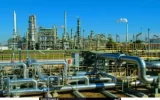Refinery capability in Africa; Iran’s opportunity to penetrate the Black Continent

According to the exclusive report of Energy Press, in recent years and after many countries turned to the development of oil refineries and setting up more of them in order to meet their needs for oil derivatives, the refining capabilities of the African continent have also grown significantly. Countries like Nigeria, Algeria, Egypt, Ghana, South Africa, Angola have refineries with large production capacities. These countries are looking for the development of crude oil processing capabilities to deal with the problems of global fuel markets.
Before 1954, there were no refineries on the African continent, and in the five decades between 1954 and 2004, 48 refineries were established, helping to build and strengthen refining capabilities in Africa. In 1954, the first African refinery was established in Algeria, followed by the construction of a number of refineries owned by foreign oil companies in Angola, Kenya, Ghana, Senegal, Ivory Coast, Gabon, Tanzania and Nigeria.
After the nationalization of the oil industry in many countries, in the 1970s, many national refineries were established, such as Arzew in Algeria, Warri in Nigeria, Korav in Congo, and Sonara in Cameroon. Also, in 2001, the Khartoum refinery in Sudan and in 2002 the Midor refinery in Egypt were established in the free zone of Alexandria with a production capacity of 100,000 barrels per day.
In this regard, in January 2024, Nigeria’s “Dangote” refinery, as the largest oil refinery on the African continent, began production with a production capacity of 650,000 barrels per day. Of course, other refineries in Ghana and Angola all help boost refining capabilities in Africa.
Dangote Refinery
The construction cost of the Dangote refinery was about 19 billion dollars, which is located in the Lekki Free Zone on the outskirts of Lagos and covers an area of 2,635 hectares (26,350,000 square meters). This unit is the first refinery owned by the private sector in Nigeria. This refinery is expected to be fully operational next year (2025).
The Dangote refinery – owned by Africa’s richest man, Aliko Dangote – will help end Nigeria’s dependence on fuel imports and transform it from a major importer of refined petroleum products to self-sufficiency in domestic refining capacity, as it can process 53 million liters of gasoline per day, or about 300,000 to produce barrels of oil per day.
Also, in January 2024, it was announced that the trial operation and commercial production of the upgraded Port Harcourt refinery with a daily production capacity of 60,000 barrels in the first phase of development to supply fuel to 12 states was announced. The second phase of the Port Harcourt refinery development process is scheduled to be completed in the last quarter of 2024 with a capacity of 150,000 barrels per day, bringing the total production in two phases to 210,000 barrels per day.
As one of the largest oil producers in Africa, Nigeria is also working to rebuild the Kaduna and Warri refineries, and in November 2022, a Nigerian company announced plans to build a refinery on Tongji Island with investments of about $68 million and a capacity of initially 100,000 liters per day and then increase to 400,000 liters per day.
Oil refining in Ghana
Ghana has boosted Africa’s refining capabilities through 2024 following the opening of a new refinery in the Tema heavy industrial zone in the Greater Accra region. On January 26, China’s Sentuo Oil Refinery launched the first phase of a two-stage refinery located 30 kilometers east of the capital, Accra, with a capacity of two million tons per year to meet part of domestic demand and reduce reliance on imported petroleum products. , because it is a net importer of crude oil.
When the second phase of the refinery is put into operation, the crude oil processing capacity of this refinery will reach 5 million tons per year, but the timeframe for the completion and start of the second phase of this project has not been officially announced by the Ghanaian government or the Chinese company.
Refining in Angola
Angola is planning joint ventures with neighboring countries to increase Africa’s refining capabilities through the development of pipelines with Zambia, in line with its efforts to become a regional supply hub.
Also, the first phase of the Cabinda refinery – with a capacity of 30,000 barrels per day and producing diesel, heavy fuel, jet fuel and naphtha – is expected to be operational by mid-2024. Of course, its capacity will double and reach 60,000 barrels per day.
The Suyo refinery project is also scheduled to be completed next year, 2025, with a capacity of 100,000 barrels per day. Also, the development of a refinery in Lobito County will be operational by 2026 and will produce approximately 200,000 barrels per day, signaling the continued growth of refining capabilities in Africa in the coming years.
- Comments sent by you will be published after approval by site administrators.
- Comments that contain slander will not be published.
- Comments that are not in Persian or not related to the news will not be published.

Comments
Total comments : 0 Awaiting review : 0 Date: 0